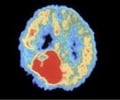
Dr. Shawn Li, PhD, and his team at Western's Schulich School of Medicine and Dentistry, identified that a protein called Numb functions to promote the death of cancer cells by binding to and stabilizing a tumor suppressor protein called p53 -a master regulator of cell death.
The scientists found when Numb is reduced or methylated by an enzyme called Set8, it will no longer protect p53.
"If you don't have Numb in a cell, then the p53 can be degraded very quickly, and these cells become resistant to chemotherapy," explained Li, a professor of Biochemistry and Canada Research Chair in Cellular Proteomics and Functional Genomics.
"So if we can prevent Numb from being methylated in cancer cells, then we will have the means to sensitize the cell to chemotherapy," he explained.
Now that he's identified the Set8-Numb-p53 pathway, Li is investigating various drugs to find a Set8 inhibitor, which could be used as a novel breast cancer therapy alone, or in combination with other chemotherapy regiments.
Advertisement
Source-ANI














